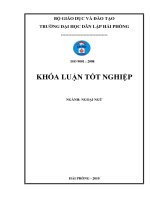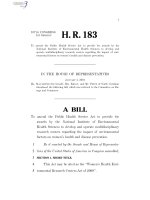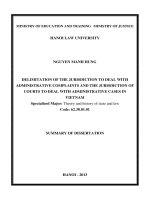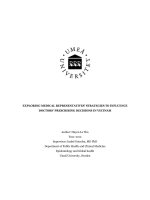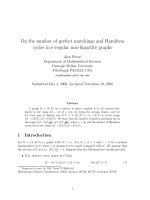Legal rules on environmental protection applicable to petrol and oil business in vietnam
Bạn đang xem bản rút gọn của tài liệu. Xem và tải ngay bản đầy đủ của tài liệu tại đây (477.87 KB, 76 trang )
VIETNAM NATIONAL UNIVERSITY, HANOI
VIETNAM JAPAN UNIVERSITY
NGUYEN TA BINH DUONG
LEGAL RULES ON ENVIRONMENTAL
PROTECTION APPLICABLE TO PETROL
AND OIL BUSINESS IN VIETNAM
MASTER'S THESIS
PUBLIC POLICY
Hanoi, 2020
VIETNAM NATIONAL UNIVERSITY, HANOI
VIETNAM JAPAN UNIVERSITY
NGUYEN TA BINH DUONG
LEGAL RULES ON ENVIRONMENTAL
PROTECTION APPLICABLE TO PETROL
AND OIL BUSINESS IN VIETNAM
MAJOR: PUBLIC POLI CY
CODE: 8340402.01
RESEARCH SUPERVISOR:
Dr. BUI HAI THIEM
Prof. NAOHISA OKAMOTO
Hanoi, 2020
ACKNOWLEDGEMENT
Firstly, I would like to thanks to my supervisors, Prof. Naohisa Okamoto and
Dr. Bui Hai Thiem. Both of them have kindly guided me in the learning process as
well as in completing the thesis. These are very valuable guidelines not only in the
process of doing this thesis but also for my steps in the process of learning and
career later.
I would like to express my gratefulness to the teachers at Vietnam Japan
University, the Office of Master of Public Policy, for creating favorable conditions
for me during my study and research.
Sincere thanks to my colleagues at the Department of Legal Affairs of
Ministry of Industry and Trade (MOIT) and other people for providing data and
documents to help me complete my thesis. Thanks to everyone for in-depth
interviews.
Finally, I would like to thank my family and my friends, who are always
willing to share and help with learning and life.
Sincerely
Hanoi, 2020
Nguyen Ta Binh Duong
i
TABLE OF CONTENTS
ACKNOWLEDGEMENT ................................................................................... i
LIST OF TABLES ............................................................................................. iv
LIST OF FIGURE............................................................................................... v
LIST OF ABBREVIATIONS............................................................................ vi
ABSTRACT ....................................................................................................... vii
CHAPTER 1: INTRODUCTION ...................................................................... 1
1.1. The rational of research ...................................................................................... 1
1.2. Research questions ............................................................................................. 2
1.3. Literature view ................................................................................................... 3
1.3.1. International research....................................................................................3
1.3.2. Domestic research ..........................................................................................4
1.4. Research objective and tasks .............................................................................. 5
1.5. Scope of research ................................................................................................ 5
1.6. Research methods ............................................................................................... 6
1.6.1. Data collection source ...................................................................................6
1.6.2. Data collection methods.................................................................................6
1.7. Theoretical and practical meanings of the research ........................................... 9
1.8. Thesis structure ................................................................................................... 9
CHAPTER 2: RATIONALE AND PRACTICAL BASIS OF LEGAL
RULES ON EP APPLICABLE TO PETROL AND OIL BUSINESS IN
VIETNAM.......................................................................................................... 11
2.1. Rationale of legal rules on EP applicable to petrol and oil business in Vietnam11
2.1.1. Basic concepts related to legal rules on EP applicable to petrol and oil
business in Vietnam ................................................................................................11
2.1.2. The role of petrol and oil..............................................................................14
2.1.3. The need to promulgate environmental and EP regulations in the petrol and
oil business .............................................................................................................16
2.1.3. Influential factors and criteria for assessing the formulation and
promulgation of legal provisions on EP in petrol and oil trading ........................20
2.2. International experience on the legal rules on EP in petrol and oil business ... 23
2.2.1. Philippines ...................................................................................................24
2.2.2. Thailand .......................................................................................................25
2.2.3. The United States .........................................................................................27
2.2.4. Japan ............................................................................................................30
2.2.5. Lesson for Vietnam.......................................................................................31
2.3. Conclusion Chapter 2 ....................................................................................... 31
CHAPTER 3: LEGAL RULES ON EP APPLICABLE TO PETROL AND
OIL BUSINESS IN VIETNAM AND THEIR IMPLEMENTATION ........ 32
3.1. The system of legal documents on EP currently applicable to petrol and oil
business in Vietnam ....................................................................................................... 32
ii
3.2. Contents of legal rules on EP in petrol and oil business .................................. 35
3.2.1. State management agencies on EP in petrol and oil business in Vietnam ..35
3.2.2. Legal rules on responsibilities for conducting EIA .....................................37
3.2.3.EP responsibilities of petrol and oil production and business establishments
................................................................................................................................37
3.2.4. Legal rules on EP fee ...................................................................................38
3.2.5. Legal rules on Preventing and responding to environmental emergencies
and Oil spill incident response plan ......................................................................38
3.2.6. Legal rules on responsibility to pay taxes for EP ........................................39
3.3. The environmental management tools ensure the implementation of the Law
on EP in petrol and oil business in Vietnam ................................................................. 41
3.3.1. Legal tool for EP ..........................................................................................42
3.3.2. Economic tool for EP ...................................................................................42
3.3.3. Technical tool for EP ...................................................................................43
3.3.4. Educational tool for EP ...............................................................................44
3.4. The application of legal rules on EP in petrol and oil trading activities in
Vietnam ......................................................................................................................... 45
3.4.1. Advantages in implementing the legal rules on EP applicable to petrol and
oil business in Vietnam...........................................................................................45
3.4.2. Limitations of the legal rules on EP in petrol and oil business in Vietnam 47
3.5. Conclusion Chapter 3 ....................................................................................... 51
CHAPTER 4: RECOMMENDATIONS FOR IMPROVING THE LEGAL
RULES ON EP APPLICABLE TO PETROL AND OIL BUSINESS IN
VIETNAM.......................................................................................................... 52
4.1. The context and requirements for the improvement of legal rules on EP
applicable to petrol and oil business in Vietnam ........................................................... 52
4.2. General direction for improving the legal rules on EP applicable to petrol and
oil business in Vietnam ................................................................................................. 53
4.3. Basic solutions to improve the legal rules on EP applicable to petrol and oil
business in Vietnam ....................................................................................................... 54
4.4. Recommendations to improve the legal rules on EP applicable to petrol and oil
business in Vietnam ....................................................................................................... 57
CHAPTER 5: CONCLUSION ......................................................................... 58
REFERENCES .................................................................................................. 59
ANNEX 1 ............................................................................................................ 62
ANNEX 2 ............................................................................................................ 64
iii
LIST OF TABLES
Table 1.1. The In-depth interview plan …………………………….……...…. 7
Table 2.1. Petrol and oil exports in the first 11 months of 2019 ……………... 15
Table 2.2. Rate of fuel loss incurred in the petrol and oil storage …………… 17
Table 3.1. Tariff table from 2012 …………………………………………….. 39
Table 3.2. Tariff table from 2019……………………………………………... 40
iv
LIST OF FIGURE
Figure 3.1. The system of legal documents On ep currently applicable to petrol and
oil business in Vietnam
………………………………………………………..32
v
LIST OF ABBREVIATIONS
EIA
EP
MOF
MOIT
MONRE
MOST
UNEP
USEPA
VEA
Environmental Impact Assessment
Environmental Protection
Ministry of Finance
Ministry of Industry and Trade
Ministry of Natural Resources and Environment
Ministry of Science and Technology
United Nations Environment Programme
United States Environmental Protection Agency
Vietnam Environment Administration
vi
ABSTRACT
Petrol and oil are the main fuel for all activities of the economy. Meanwhile,
they are substances potentially causing environmental pollution and high fire and
explosion.
Recognizing the importance as well as the dangers of this item, Vietnam has
classified petrol and oil as one of the commodities subject to business conditions. In
order to participate in petrol and oil business, it is necessary to comply with
different legal rules. In addition to the legal rules on construction, technology, fire
and explosion prevention and fighting, petrol and oil business entities must comply
with the legal rules on environmental protection (EP).
This thesis provides a critical review of legal rules on EP applicable to petrol
and oil business in Vietnam. It analyzes limitations of these rules and argues for
major changes of these rules for the improvement in EP.
vii
CHAPTER 1: INTRODUCTION
1.1.
The rational of research
The environment has an important influence on everyone's life, living things
and the economic, cultural and social development of a country. Protection of the
environment has become a global concern and one of Vietnam's most current
concerns with a guiding view throughout the legal development and enforcement
that protection of people's health is a top priority, ensuring that everyone can live in
a clean environment.
Vietnam has been accelerating industrialization and modernization of the
country at an increasing pace. Along with socio-economic development, the
environmental quality has deteriorated due to production and business activities,
including factors from petrol and oil trading. Recognizing that, Vietnam has been
promoting EP in various ways. Among the important measures taken has been the
development of a legal system on EP in the petrol and oil business.
Petrol and oil are the main fuel for the economy's activities. While these is a
limited resource and cannot be replaced. In Vietnam, petrol and oil are the kind of
commodities subject to business conditions. The management and operation of
petrol and oil facilities are large and complex with potential risks and tremendous
impacts on the environment. If any negligence in petrol and oil activities happens,
there will be environmental disaster, affecting human health, life, property, security
and order, and the environment of the community.
After recent efforts by the Government to cut down the conditions for
business investment, petrol and oil business has started to increase significantly
with a variety of participants. Therefore, in order to participate in petrol and oil
trading activities, it is necessary to comply with different regulations. In addition to
the legal rules on construction, technology and fire and explosion prevention and
fighting, petrol and oil business entities must comply with the legal rules on EP.
Environmental pollution due to petrol and oil business activities in Vietnam
is now increasing due to many different reasons. A major contributing factor to that
1
has been certain shortcomings and limitations in the existing legal system.
Therefore, it is necessary to study the legal rules on EP in the petrol and oil business
field.
Researching on "Legal rules on environmental protection applicable to the
petrol and oil business in Vietnam", the author re-affirms the important role of the
legal rules on EP applied in the field of petrol and oil business in Vietnam. The
thesis first provides an overview of current legal rules on EP applied in petrol and
oil business in Vietnam through desk study. It takes a qualitative approach in
investigating expert opinions, analysis and comments on the legal rules on EP
applicable to petrol and oil trading in Vietnam. Based on the critical analysis, the
thesis recommends solutions to facilitate the observance of law on EP in the field of
petrol and oil business, ensuring that “everyone has the right to live in a clean
environment” and promoting the process of economic development in Vietnam.
Using my professional experience, based on the knowledge provided in the
Master of Public Policy program at Vietnam – Japan University, the author hopes
that the thesis will contribute to consolidation and improvement of Vietnam's legal
rules on EP on petrol and oil business.
1.2.
Research questions
There are a number of important questions in this research:
- What is the impact of petrol and oil business on the current environmental
pollution in Vietnam?
- Are the legal rules in the petrol and oil business being effectively applied to
EP in Vietnam?
- Is there a correlation between the level of environmental pollution caused
by petrol and oil business and the legal rules formulated and implemented in
Vietnam?
- What should the Government of Vietnam do to improve the legal rules on
EP applicable to petrol and oil business in Vietnam?
2
1.3.
Literature view
1.3.1. International research
In the world, the legal rules on EP have been a research interest by many
scientists and organizations.
Pigou, A. C (1920) proposed the idea of using tax tools to overcome adverse
external impacts on the environment. He has stated that the taxation principle is to
hit directly on the person who creates an adverse environmental impact. At the same
time, tax revenues are used to remedy the consequences of the bad effects.
Gupta and Mahler, W. (1994) explained why petrol and oil is subject to
many taxes at high tax rates. However, the above study was conducted in countries
with petrol and oil market characteristics that are very different from Vietnam, thus
the application is very difficult for the current situation of Vietnam.
Yasamis, F. D. (2011) points out that there are three main environmental
management strategies developed to address environmental quality issues:
command and control strategies, self-control strategies and economic tools. In order
to effectively protect the environment, all of these strategies need to be used in a
harmonious manner depending on the strengths and weaknesses of the socioeconomic situation, the availability of financial funds, people's awareness. However,
the research also emphasizes the importance of economic instruments in EP.
Bell, S. & McGillivray, D. & Pederson, O. W. (2013) proved that
environmental policy is the concretization of each country's law on EP and
international environmental conventions. Each level of administrative management
has its own environmental policies, both concretizing laws and policies of higher
levels and taking into account local characteristics. The correctness and success of
local policies have an important role in ensuring the success of central policies.
These international studies were quite outdated and not focusing on EP on
petrol and oil or conduct in countries with petrol and oil market characteristics that
are different from Vietnam, so the application is very difficult for the current
situation in Vietnam
3
1.3.2. Domestic research
In Vietnam, the law on environment protection in general and in each
specific area of social life has been raised by the Party and the State, and especially
scientists, who do special theoretical work. Particularly interested in research in
many aspects, different angles, such as:
Dinh, P. Q. (2011) studied legal rules on Vietnam's EP, clarified some
theoretical issues of legal rules on EP and proposed major solutions to complete the
legal rules on EP in the near future.
Nguyen, T. H. (2016) evaluated the effectiveness of the EP tax law on petrol
and oil. The article points out the inadequacies of the current legal rules on EP tax
on petrol in Vietnam and provides some solutions to improve the effectiveness of
these regulations.
Vuong, T. T. H & Pham, X. T. (2017) raised some issues to be noted about
EP tax policies in some countries and made some recommendations for tax
protection policy on EP in Vietnam.
The above studies have shown many solutions to protect the environment.
However, the majority of studies focus on EP tax while none focused on specific
studies on the other legal rules on EP that applied to petrol and oil business in
Vietnam. The promulgation and implementation of the legal rules on this issue are
still limited such as the regulations are valid in a short time and there are still many
inconsistent regulations.
Existing literature does not focus on EP on petrol and oil or only discuses
legal rules on EP tax on petrol and oil. However, there has not been any research
project on EP in petrol and oil business in Vietnam. Therefore, the thesis aims to
systematizing theoretical and practical issues on EP in petrol and oil business,
analyzing the status of legal rules on EP in petrol and oil business in Vietnam over
the past time and proposing solutions to improve the legal system of EP in petrol
and oil business in Vietnam in the coming time.
4
1.4.
Research objective and tasks
- Research objective: The research thesis aims to contribute to completing
the legal rules on EP applicable in the petrol and oil business in Vietnam in the
coming time.
- Tasks to be completed:
+ Clarifying the theoretical basis of the legal rules on EP in petrol and oil
business activities;
+ Analyzing and systematizing the legal rules on EP applied in the petrol and
oil business in Vietnam;
+ Assessing the effect of legal rules on EP applicable to petrol and oil
business in Vietnam - Achievements, limitations and causes;
+ Proposing solutions to improve the legal rules on EP applied in the petrol
and oil business sector.
1.5.
Scope of research
The thesis focuses on the current legal rules on EP applied in the field of
petrol and oil business in Vietnam that are still valid in 2019 in Vietnam.
In this study, the petrol and oil business in the thesis will focus on petrol and
oil storage and transportation activities in Vietnam market.
Because the lack of resources the research only focuses on analyzing the
main legal rules currently applied in EP in the petrol and oil business field, factors
other than the legal aspect that also affect in the reality will not be mentioned much
or not mentioned in this thesis.
In addition, there are still some regulations that have not been included in
specific studies such as indicators of technical regulations and standards on EP in
the field of petrol and oil trading, relevant regulations such as specific regulations
on fire prevention and fighting, chemicals.... The international agreements on
environment to which Vietnam is a member are also not mentioned in the thesis
5
because the legal rules in Vietnam are subject to international commitments except
the Constitution 2013.
1.6.
Research methods
1.6.1. Data collection source
The data is collected from many different sources including secondary and
primary data.
Secondary data was collected by the author from textbooks, reference books,
monographs, summary reports of research results topics at all levels: concepts
related to the legal rules on EP applicable to petrol and oil business; environmental
management tools to ensure law enforcement on EP in petrol and oil business...
The sources include figures and materials from articles in scientific journals,
scientific thematic reports; Information from reports of the Government,
ministries/sectors of Vietnam, petrol and oil enterprises in Vietnam; reports of
international agencies; Documents and decisions related to the legal rules on EP in
general, the legal rules on EP in petrol and oil business in Vietnam in particular.
Primary data is collected through the extraction of information from minutes
of meetings and discussions with businesses, managers, experts at the MOIT, the
MONRE, etc. Opinions of managers and enterprises are an important primary
source to assess the formulation and enforcement of legal rules on EP in petrol and
oil trading activities in Vietnam. It provides ample evidence for research along with
secondary data for the thesis to make more rigorous arguments.
1.6.2. Data collection methods
Desk research method: Collecting, analyzing and extract information
from available sources related to research topics, including legal rules,
government’s decrees and ministerial/sectoral circulars, international experience.
This method is used in Chapter 2.
In-depth interview method: Through the integration of information
collected from meetings and discussions with businesses and officials at MOIT and
6
MONRE to collect comments, advice on ideas and solutions. This method will be
used in Chapter 3, 4.
Table 1.1 The In-depth Interview Plan
No
Name of
Interviewees
Topic
Objectives
organization
1
Vietnam
3 Officials
+ Responsibilities of +
in
To
get
Environment
MONRE
Administration
activities in general knowledge of
(MONRE)
and
petrol
and
EP deeper
oil MONRE and
business in particular
legal rules on
+ Which tools the
State
is
using
manage
EP
to
the
environment?
+ Achievements and
limitations of the legal
rules on EP
2
Industrial
Safety 3 Officials
Techniques
and
Responsibilities
to
Agency,
business
Legal
Affairs,
Department
Domestic
of
of
Market
To
get
MOIT in EP applicable deeper
Environment
Department
of +
petrol
and
oil knowledge of
MOIT;
+ Legal rules on EP
applicable on petrol
and oil business in
legal
rules on EP;
experience
from
some
countries
Vietnam
(MOIT)
+
International
experience
in
legal
rules on EP in petrol
7
No
Name of
Interviewees
Topic
Objectives
organization
and oil business
+ Achievements and
limitations of the legal
rules on EP
3
Representatives of Director
some petrol and oil Vice
business
Director,
enterprises
Employees
or + Legal rules on EP Identify
the
that enterprises must legal rules on
2 comply with
EP applicable
+ Achievements and
limitations of the legal
to petrol and
oil;
difficulties
rules on EP
encountered
+ Which legal rules with
should
be
legal
amended rules
and supplemented?
Source: Author
The author chooses officials from three state agencies directly managing EP
in the petrol and oil business in Vietnam for interview. Representatives from a
number of enterprises which took part in interview including Vietnam Petroleum
Corporation, Petroleum Vung Tau Joint Stock Company, Petroleum Company B12
- are large companies in the petrol and oil industry in Vietnam. The interviews are
conducted from September 2019 to November 2019.
For state management agencies, the author combines participation in
seminars, conferences on EP in the petrol and oil business to conduct in-depth
interviews. For enterprises, the author takes advantage of the inspection and direct
communication through the survey team of the MOIT on EP in the field of petrol
and oil business. Questions and answers of interviewees are attached in the annex.
8
1.7.
Theoretical and practical meanings of the research
Theoretical meanings:
A critical analysis of the legal rules on EP for the petrol and oil business in
Vietnam contributes to further knowledge in the field, drawing lessons from the
practical implementation of the legal rules on EP in Vietnam.
Practical meanings:
The thesis provides the baseline data and evidence for recommending
solutions for reviewing and improving policies and law. The thesis will be used as a
reference for companies operating in the petrol and oil business sector.
1.8.
Thesis structure
The thesis has 5 chapters as follows:
Chapter 1: Introduction. This part presents the rationale of research,
research objective and tasks, research methodology, scope of research, research
questions, expected contribution of the research, literature view, the expected
structure of the thesis.
Chapter 2: Rationale and practical basis of legal rules on EP applicable
to petrol and oil business. This part presents the rationale, practical basis and the
need to promulgate legal rules on EP on the petrol and oil business field. In
addition, this chapter analyses the influential factors and criteria for assessing the
formulation and promulgation legal rules on EP in petrol and oil trading.
Chapter 3: Legal rules on EP applicable to petrol and oil business in
Vietnam and their implementation. This chapter analyzes the current situation,
content and application of legal rules on EP on petrol and oil business in Vietnam.
Chapter 4: Recommendations for improving the legal rules on EP
applicable to petrol and oil business in Vietnam. This part presents the
achievements and limitations of the legal system on EP in the petrol and oil
business in Vietnam. From that give recommendations to improve the legal system
in this field.
9
Chapter 5: Conclusion. This chapter summarizes the research issues and
research limitations raised in the thesis.
10
CHAPTER 2: RATIONALE AND PRACTICAL BASIS OF LEGAL
RULES ON EP APPLICABLE TO PETROL AND OIL BUSINESS IN
VIETNAM
2.1.
Rationale of legal rules on EP applicable to petrol and oil business in
Vietnam
2.1.1. Basic concepts related to legal rules on EP applicable to petrol and oil
business in Vietnam
2.1.1.1.
Environmental concept and definition of “environmental protection”
The “environment” is a broad concept, defined in many different ways,
especially after The UN Conference on the Human Environment held in Sweden in
1972. The Conference adopted the Stockholm Declaration, which consists of 26
important principles, laying the groundwork for global policy on the protection and
improvement of human habitats, clearly demonstrating the perception that this is a
problem. The strategic importance of the well-being of all peoples and developing
the world economy is the duty of every government.
In the UNESCO Declaration of 1981, the environment is understood as: “All
natural systems and man-made systems around us, in which people live and work
by themselves exploit natural or artificial resources to satisfy human needs.”
In that spirit, Law on EP in 2014 defines Environment as “a system of
natural and man-made physical elements that affect the existence and development
of human beings and living organisms”.
Article 3 of the Law on EP in 2014 defines “Environmental protection
activities means activities of conserving the environment, and preventing and
restricting adverse impacts on the environment; Responding to environmental
incidents; Remedying environmental pollution and degradation, improving and
rehabilitating the environment; Exploiting and rationally using natural resources in
order to keep the environment clean.”
11
According to the author, the environment is a combination of natural factors
and social factors that are closely related. These factors affect the production, life,
existence and development of human as well as nature.
The environment includes the natural environment and the artificial
environment. The natural environment consists of all the elements that occur
naturally on Earth. It is an environment where living things interact with each other.
The natural environment provides us with air to breathe, mineral resources, soil for
cultivation, building houses, ...
Unlike natural environment, artificial environment are all artificial factors
such as chemical composition, physical properties ... These factors are created by
humans and dominated by humans.
There is also the concept of the social environment. The social environment
is the relationship between people. It is laws, commitments, institutions,
regulations ... at different levels. Social environment has the task of orienting people
according to a certain framework for favorable development, making human life
different from other living beings.
Although these factors are contradictory, they co-exist and interact closely
with each other. The ingredients will always metabolize in a certain cycle to create
balance.
In the thesis, the environment the author aims at is the natural environment.
EP in the research is protection of the natural environment. EP is the activities to
improve the environment, keep the environment fresh and minimize negative
impacts on the environment. EP also helps ensure ecological balance, overcoming
the consequences that humans cause to the environment.
2.1.1.2.
Definition of “Law on EP”:
In Law on EP in 2014, “The law on environmental protection is a system of
legal documents issued by the state or competent agencies, including legal
normative acts, legal principles governing relationships arising between entities in
the process of exploitation, use or impact on one or several elements of the
12
environment on the basis of combining different adjustment methods to protect an
effective way of human habitat.”
2.1.1.3.
Definition of “Petrol and oil” and “Petrol and oil business”
“Petrol and oil” and “Petrol and oil business” are defined in Decree
No.83/2014/ND-CP as follows:
“Petrol and oil is a general term used to refer to products of the crude oil
refining process which are used as fuel, including engine petrol, diesel oil, kerosene,
fuel oil and jet fuel; bio-fuel and other products used as engine fuel, excluding
liquefied gas and compressed natural gas.”
The above concept includes only products from the refining of crude oil used
for fuel, petrol and oil from the recycling of other raw materials (used petrol and
oil) that has not been controlled. This is a legal loophole because used petrol and oil
also cause environmental pollution such as petrol and oil from the crude oil refining
process, but has not been put into the entities of management. Because it is not
subject to management, there are currently no technical standards for the quality of
these petrol and oil.
“Petrol and oil business covers export, import, temporary import for reexport, border-gate transfer and export processing of petrol and oil and raw
materials; production and processing of petrol and oil; distribution of petrol and
oil on the domestic market; and provision of services of warehouse and port leasing
and receipt, preservation and transportation of petrol and oil.”
2.1.1.4.
Vietnam
Definition of legal rules on EP applicable to petrol and oil business in
Based on the above mentioned, the concepts of the environment, EP, the
laws on EP, petrol and oil business, legal rules on EP applicable to petrol and oil
business in Vietnam are contained in the legal documents on EP issued by the
Vietnamese State and guaranteed to be implemented and applied to all entities
involved in petrol and oil business. Accordingly, the legal rules govern the
relationships arising among entities with the use thereof or impacts on the
13
environment in petrol and oil trading activities on the basis of combining different
regulation methods in order to protect the environment effectively.
The law on EP in petrol and oil business basically has the characteristics of
law on EP. However, due to the characteristics of petrol and oil as special
commodities, in addition to the law on EP in petrol and oil trading, there are a
number of striking characteristics as follows:
It has complicated scope and subjects of regulation, including: social
relations arising in the process of petrol and oil trading, relations to the state
management of EP in petrol and oil trading activities, the relationship of
international cooperation in EP.
It contains various types of law branches such as the Law on EP, the Law on
Enterprise, etc.
The goal of each country in its social and economic development is to
preserve a good balance of the natural environment, including the requirement to
ensure a healthy environment. One of the ways to minimize the impacts of petrol
and oil business on the environment for developing an enabling regulatory
framework.
2.1.2. The role of petrol and oil
+ The role for the economy: “Petrol and oil” are important input for many
industries. It can be said that petrol and oil has a comprehensive effect on all
industries and sectors of the economy, including agriculture, industries and
services… As fuel is a factor in production prices, changes in petrol and oil prices
cause related products to fluctuate, and in turn affecting other products. As the
world economic integration increases, the movement of goods and services taking
place around the world requires the main source of fuel for transporting goods to
different parts of the world that is petrol and oil.
Petrol and oil are the valuable commodity that contributes to the GDP of
many countries, especially through exports.
14
Table 2.1 Petrol and oil exports in the first 11 months of 2019
First 11 months of 2019
Compared to the same period in
2018 (%)
Market
Tons
Value (USD)
Tons
Value
Cambodia
621.092
377.648.215
-3,63
-14,93
China
488.679
348.276.842
15,99
16,51
Thailand
183.847
98.599.345
38,81
23,67
Singapore
187.423
84.538.665
184,04
151,86
Malaysia
165.235
68.484.631
20,9
13,63
Source: Vietnam Customs
+ The role for social life: Petrol and oil are the fuel used for daily means of
transport which is currently difficult to replace. Although new facilities have been
introduced to use technologies that use clean energy such as solar energy, bio-fuel,
etc., the number of such facilities is negligible. In addition, the cost of investing and
developing these technologies often requires huge capital and many businesses are
not much interested in developing in this new fuel. Currently, due to the extremely
important role of petrol and oil for the economy and social life, the price of petrol
and oil affects almost all goods and thereby affects every aspect of social life.
+ The role for national security and defense: Petrol and oil are not only
important for the economic development and people's life, but also particularly
important in the field of security and defense. Almost all countries have established
a separate security and supply mechanism for national security and defense.
In all areas of social life, petrol and oil plays a particularly important role.
Petrol and oil are not only a guarantee for the normal production and life activities,
but also participates in creating social values that make social life increasingly
improved.
15
2.1.3. The need to promulgate environmental and EP regulations in the petrol
and oil business
Petrol and oil are conditional business items, which pose a lot of risk of fire
and serious EP if discharged to the environment, especially oil which may pollute
water sources and petrol vapor can cause suffocation leading to death.
Firstly, it is worth noting the characteristics of petrol and oil business to the
environment:
Petrol and oil in liquid form are very flammable, especially sensitive to
change in ambient temperature. In conditions of temperature above 23 degrees
Celsius with pressure above 100 degrees Atmosphere of pressure, only one spark of
electric spark can ignite. This feature requires a very strict fire prevention in petrol
and oil business. Means and equipment used for petrol and oil business must be
specialized equipment. Fire prevention and fighting is associated with the entire
process of petrol and oil trading.
Petrol vapor comes from the processes of importing, exporting, storing and
transporting petrol and oil, which is the main cause of air pollution. Vapors in the
air may also cause fire or explosion. When mixed with air ratio in the range of 1-7%
and sparks, it will cause an explosion (Vietnam Environment Administration - VEA,
2013). Therefore, it is necessary to have strict protection and prevention measures
for the process of transportation, export and import.
Chemical substances are discharged in the exhaust of petrol vehicles such as
carbon monoxide (due to the use of air conditioners in vehicles), sulfur dioxide,
nitrogen oxide. With the excessive increase of vehicles as today, the atmosphere is
no longer clean, or causing odor, contributing to the increase of greenhouse effect.
Petrol and oil are very vulnerable products in the process of transportation,
storage and trading. Therefore, in production and business, it is necessary to
calculate the movement path of petrol and oil and take reasonable measures to
minimize wastage.
16


